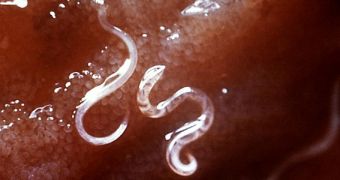A recent investigation carried out by an international team of scientists has found that, thanks to climate change and global warming, the number of snail fever cases reported in Africa on a yearly basis is likely to decline in the not so distant future.
Snail fever is caused by a parasite known to the scientific community as Schistosoma mansoni. The parasite infects humans by piercing the skin and entering the body, and its larvae rely on freshwater snails as their intermediate hosts.
According to the researchers who took part in this study, snail fever is bound to become less common in Africa due to the fact that, as local weather conditions change, the snails that the parasite needs in order to survive will lose a significant portion of their natural habitat.
Once the parasite's host snails experience a decline in their population, odds are that annual snail fever cases documented in this part of the world will also drop.
“Our research shows that the expected effects of climate change will lead to a reduction in suitable habitats for four out of five species of host snails for the parasite,” says researcher Anna-Sofie Stensgaard with the University of Copenhagen, as cited by Science News.
“According to our models, several areas will become too hot for the snails in the future and new precipitation patterns will affect the freshwater areas where they live,” she adds.
Anna-Sofie Stensgaard and her colleagues detail that, after analyzing how different climate change scenarios would affect snail populations in Africa, they found that the species documented to act as a host for Schistosoma mansoni would lose enough habitat for infection risk areas to be reduced by about 19% by the year 2080.
Despite their findings, the researchers warn that climate change and global warming could actually help Schistosoma mansoni's snail hosts thrive in other areas.
“Our models are not designed to pinpoint changes on a local scale but they provide an overall picture of a decline in areas suitable for the parasite in West and Central Africa, while it may be able to establish itself in new areas especially in Africa's southern regions,” warns specialist Thomas Kristensen.
What's more, the specialists say that human activities in the regions inhabited by both the parasite and its hosts could interfere with their predictions.

 14 DAY TRIAL //
14 DAY TRIAL //